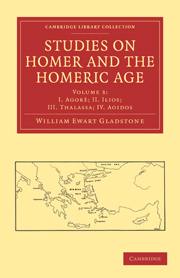Book contents
- Frontmatter
- ADVERTISEMENT
- Contents
- I AGORÈ OR THE POLITIES OF THE HOMERIC AGE
- II ILIOS
- III THALASSA
- EXCURSUS I
- EXCURSUS II
- IV AOIDOS
- SECT. I On the Plot of the Iliad
- SECT. II The Sense of Beauty in Homer: human, animal, and inanimate
- SECT. III Homer's perception and use of Number
- SECT. IV Homer's Perceptions and Use of Colour
- SECT. V Homer and some of his Successors in Epic Poetry: in particular, Virgil and Tasso
- SECT. VI Some principal Homeric Characters in Troy. Rector: Helen: Paris
- SECT. VII The declension of the great Homeric Characters in the later Tradition
- Plate section
SECT. V - Homer and some of his Successors in Epic Poetry: in particular, Virgil and Tasso
Published online by Cambridge University Press: 05 October 2010
- Frontmatter
- ADVERTISEMENT
- Contents
- I AGORÈ OR THE POLITIES OF THE HOMERIC AGE
- II ILIOS
- III THALASSA
- EXCURSUS I
- EXCURSUS II
- IV AOIDOS
- SECT. I On the Plot of the Iliad
- SECT. II The Sense of Beauty in Homer: human, animal, and inanimate
- SECT. III Homer's perception and use of Number
- SECT. IV Homer's Perceptions and Use of Colour
- SECT. V Homer and some of his Successors in Epic Poetry: in particular, Virgil and Tasso
- SECT. VI Some principal Homeric Characters in Troy. Rector: Helen: Paris
- SECT. VII The declension of the great Homeric Characters in the later Tradition
- Plate section
Summary
The great Epic poets of the world are members of a brotherhood still extremely limited, and, as far as appears, not likely to be enlarged. It may indeed well be disputed, with respect to some of the existing claimants, whether they are or are not entitled to stand upon the Golden Book. There will also be diiferences of opinion as to the precedence among those, whose right to appear there is universally confessed. Pretensions are sometimes advanced under the influence of temporary or national partialities, which the silent action of the civilized mind of the world after a time effectually puts down. Among these there could be none more obviously untenable, than that set up on behalf of Milton in the celebrated Epigram of Dryden, which seemed to place him at the head of the poets of the world, and made him combine all the great qualities of Homer and of Virgil. Somewhat similar ideas were broached by Cowper in his Table Talk. The lines, as they are less familiarly remembered, may be quoted here:
Ages elapsed ere Homer's lamp appeared,
And ages ere the Mantuan swan was heard;
To carry Nature lengths unknown before,
To give a Milton birth, asked ages more.
But this great master is also subject to undue depreciation, as well as flattered by extravagant worship.
- Type
- Chapter
- Information
- Studies on Homer and the Homeric Age , pp. 500 - 554Publisher: Cambridge University PressPrint publication year: 2010First published in: 1858



